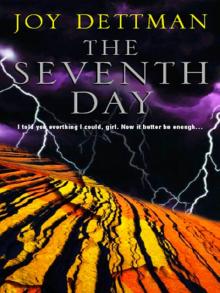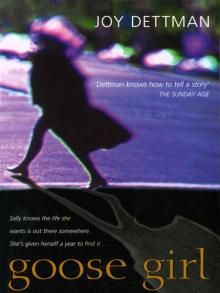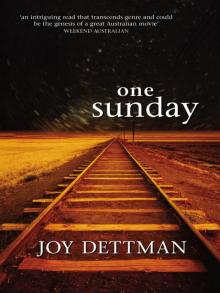- Home
- Joy Dettman
Jacaranda Blue Page 4
Jacaranda Blue Read online
Page 4
The entire house had this same inconsistency. The dark and light, the old and the new living incongruously, side by side. The lounge room was panelled in dark wood, its glass doors, that had once opened to the morning sun, were shielded day and night by heavy brown drapes, kept drawn against the dark side of the house, kept drawn against the forest of trees in the neighbouring yard, and against the eyes of the neighbour who owned the untamed forest. The minister and Mr Wilson had not spoken for fifteen years. Long ago, Stella had given up opening the drapes for Martin to close. Given up. Given up. Given up everything. Every dream. Every desire.
Within the lounge room, a modern, wide-screened television dominated. An electric heater covered the open fireplace, and a huge tan recliner chair awaited the minister’s pleasure before it. But against the walls, Angel’s heavy, brown leather, lounge suite waited for Stella, as it had for all the days of her life. A dark room. Dark memories lived in that room. Sitting on a leather chair. Waiting on that leather chair. Always waiting.
The water was boiling. She gathered her thoughts and, with a spoon, eased the eggs into the boiling water. She turned the heat down to halfway, set the stove timer to four point five minutes, then stood watching the water boil while listening to the uneven rattling of eggshell on steel.
‘Eggs,’ she said. ‘My God!’
‘Daughter?’ His head lifted in question.
‘The water, Father. It . . . it splashed . . . ’
A calendar hung behind the passage door. She stared at it, her shaking hand covering her mouth, while the eggs on the hotplate taunted her with their water dance.
From his position at the table, where he’d been writing on a notepad, Martin frowned. ‘Perhaps you should return to bed. You are not yourself today.’ She made no reply. He shrugged and returned to his writing.
Bread in the toaster. Butter from the refrigerator. Plates from the top cupboard. Knife, spoon, eggcups. She was forcing her shaking hands to function, but her mind was still on the calendar when the timer buzzed and the eggs were done.
He pushed the pad aside for her to place two eggcups and their eggs before him, the two slices of thick buttered toast on his right. ‘Do you still feel nauseous?’
She shook her head, and returned to the sink. Perhaps it was his question, perhaps the smell of hot butter, perhaps habit, but she placed more bread in the toaster, and when it popped she buttered and ate it at the sink, while staring down at her ugly brown shoes on the brown linoleum.
I won’t think of it. I will survive this thing. I will eat and sleep and the days will pass and I will survive this thing. What is done, cannot be undone. He didn’t cut me, he didn’t tie me, bind me, leave me to die on the side of a road. It is unlikely that – she looked at the table and at the two eggshells, empty already, and she turned again to the calendar. It is unlikely. And he is only a youth. There is little chance that he is carrying a disease. So much worse could have happened. So much worse.
‘Do we take our meals at the sink now, Daughter?’
‘I’m sorry.’ An aged wooden chair pulled to the table, she sat opposite the minister, stirring her tea, and playing with her second piece of toast.
The table was as old as the house, as solid as the house, but she had covered it with a white lace tablecloth, then covered the lace with a clear sheet of heavy-duty plastic – safe from her father’s frequent spillages. They had a dining room down the hall. It faced west, but its window was shaded by the front porch, and by two overgrown pencil pines. It was a good room, papered tastefully in some past era. The best of the old ornaments lived in the dining room. The antique lamp with its ruby glass bowl was on a fine old cabinet – both lamp and cabinet older than Stella’s grandparents, but when Angel was no longer able to take her meals in the dining room, Stella and Martin began eating in the kitchen. Now the best room was used as the church guild’s meeting room. Each week the women came to sit at the long oak table, to knit, to stuff and stitch the clowns, to pack them in their plastic bags, and to pass on town gossip.
The house was far too large for two people. Many rooms were rarely entered – except for dusting, and vacuuming. There were two small bedrooms downstairs; no doubt they had been the maids’ rooms. Stella had claimed one for her ironing board and sewing machine. The second was still furnished with a small wardrobe and an old iron bed.
Allowing her mind to stray a while to the empty rooms, Stella’s finger played with her father’s fresh spill of sugar. Sugar grains were picked up from the plastic tablecloth, transferred to her saucer, one by one . . . two by two . . . three by three.
When he was small, Thomas had loved visiting the empty rooms, with their smell of age trapped there in old furnishings. She’d allowed him to jump on the aged beds.
‘Can we play trampolines, Aunty Stell?’
Until he was age seven, she’d been a second mother to him.
But memory of the good times only made what he had done that much worse. She shook her head, shook memory away.
‘How could he?’ she said.
The minister glanced up. ‘I beg your pardon?’
‘I . . . I . . . ’ She coughed. ‘How will he go on? Old Mr Martin. They say he does not realise his wife is dead. They lived for each other.’
‘Yes. I doubt he will survive long without her. It is hard to lose a partner.’ He silenced, and again her mind was free to roam.
Another funeral. Flowers. She would have to go to the funeral, do the flowers. She would have to. Who would do the flowers if she didn’t?
When?
Monday, no doubt. The family wanted it on Monday. Thomas will be back in the classroom on Monday, she thought. He will be sitting in the classroom with other children while we bury Mrs Martin. Age making way for youth.
God. He is only a child. Why?
In the past year, she had rarely seen him except at youth group, but even there his appearances were rare. Bonny’s boy had been his best friend through primary school, but they had formed other friendships now.
Aunty Stell. She was honorary aunt to many children in town, but to Thomas, she had been more. She had walked him to school for years, waited for him at the school gate, listened to his spelling.
He had been her son. In those early years he had been as much her son as Marilyn’s. Always too busy at the supermarket, Marilyn had seemed pleased to escape a mother’s responsibility.
I will have to leave. Somehow. I will have to get away from here.
The minister cleared the table while she sat staring at an uneaten crust of toast. He dumped the saucepan, the dishes, the cups and glasses in the sink, then turned on the old brass tap, to splash its stream in a wide arc across the floor.
She heard him about his task and, as she sprang to her feet to save further chaos, the telephone began ringing in the hall.
‘I’ll get it,’ the minister said.
Cloth in hand, Stella stooped, mopped the floor. She looked at the cloth, smudged brown, stained by dirt, or by the brown of the floor.
The ringing silenced. Studying the cloth, she listened to the commanding, ‘Hello. Hello. Who is this? What do you want?’
Another wrong number?
A round-faced, battery-powered clock had lived for twenty years on the wall beside the sink. Now Stella stared at it, aware that the placement of the hands should mean something to her. ‘Two-fifteen,’ she said.
‘Pardon?’
‘It’s two-fifteen, Father,’ she repeated, her hands repacking the sink. She picked out a chipped glass, placed it in the plastic kitchen tidy beside the stove, before turning to the minister. ‘Who was it?’
‘That young pest again,’ he said, and he leaned at the door watching her at work. ‘You have an efficiency of movement, Daughter. Chaos bows readily to your hands,’ he said. She made no reply. He coughed, gained her attention. ‘Do you think I should report these confounded calls?’
‘It’s two-fifteen,’ she replied.
‘Yes. The day has flown. I
have had nothing but interruptions this morning. Shall it continue all afternoon, I wonder?’
‘It’s Saturday. It’s . . . It’s Miss Moreland’s day. I’ve got to go.’ She turned the water off.
On Saturdays, she sat with Miss Moreland in her bright little unit discussing world affairs and cricket scores and watching the tennis. She never missed a Saturday. Miss Moreland’s birth certificate might state that she was ninety-six, but she was younger in mind than many forty years her junior.
‘I’m late. I have to go, Father.’
‘Should I report the calls, Daughter? Get Johnson onto the young hooligan?’
‘What will be gained by reporting him? What good will it ultimately do?’ she said, unaware she was answering her own unspoken question. ‘Please leave the dishes. Please don’t touch the dishes. I’ll do them when I return. And don’t use that cloth.’ She pointed, then took the cloth in her hand. ‘Look at it, Father. That came off the floor with one wipe. It’s past time that we considered a new floor-covering.’
‘It’s functional enough, Daughter.’ He dismissed her words.
She tossed the cloth into the kitchen tidy, then walked towards the stairs.
‘I don’t believe you are well enough to go out today, and certainly not well enough to walk the distance. You should perhaps consider returning to bed.’
‘Perhaps I could take the car?’
‘I may need – ’
‘It will only be five minutes away, Father.’
‘I dare say I can leave my work and drive you there – if you are determined to go. I need to fill the tank.’
‘If you’d register the Packard – ’
‘It would be seen as wasteful extravagance,’ he said, quickly ending that conversation.
‘I’ll have to go. I’m already late.’
His head bowed, his frown grown deeper, he looked at her feet, at the floor-covering. He followed a new ripple to the fridge where the linoleum had worn through to show its hessian backing. ‘Yes,’ he said. ‘Yes. We need milk. I’ll pick some up while we’re out.’
‘I’ll get the milk.’
In the bathroom, she looked at the basin, rust-stained. It looked like blood. She shivered and turned her eyes away from it. This was a dark room, old. Everything was old. She looked at her face in the mirror. She too was old. Stained.
Behind her, she could see her father’s face reflected in the same mirror. He leaned against the door, watching her run the comb through her hair, watching her again wet down her fringe. His mirror image frowned.
The mirror was large, and not so old. She had installed it, hoping it may lend a little light to the room. ‘A wasteful extravagance. I manage well enough with the shaving mirror,’ her father had said, but she’d bought it anyway. Bonny helped fix it to the wall with the aid of Len Davis’s electric drill and some small green wall plugs. They’d done it six or eight years ago when Stella had been strong enough to argue.
‘You don’t look at all well, Daughter. I’ll feel happier if I deliver you safely to Miss Moreland’s door.’
‘Look at me, Father. Look at me for just one moment. Please see me. I am old. I’m almost as old as my own mother was when I was born,’ her reflection replied.
‘And you are in no fit state to drive today.’
‘I was driving at seventeen. I have had my licence for twenty-seven years. Twenty-seven years,’ she stressed.
‘But you have not driven the new car, and perhaps what I am attempting to say, Daughter, is today is not the best day for you to begin driving it.’
She turned from the mirror and stood facing him, waiting for him to clear the doorway, and when he did, she walked downstairs. His shaggy head shaking, he followed behind her, through the back door and out to the shed.
‘You won’t drive through the centre of town, Daughter. You’ll go around via the pool. Don’t attempt to cross the highway at the railway line. The traffic is fierce there.’
‘As always, I will do as you say.’
At the shed door, she remembered her missing briefs. Heat rushed to her head as her eyes scanned the floor, her leaden feet walking her towards the Packard. Then she smelt him. The stink of his youth was still inside the shed. His sweat. His sex. His footprint was in the drying mud. Heartbeat. Hammer. She turned, ran by her father to the side door where she grasped wood, cowered, unable to run further.
He glanced at her as he walked to his car. ‘Will you get the gates, Daughter?’
Blood was flooding her head, beating in her brain; his command had no power to move her. Her hands covering her face, she trembled in the shade of the jacaranda. She would not open the gates again, allow the outside world in. She didn’t want the world. Didn’t want to live in such a world. She would stay here. Just stay here. Die here.
The plaintive beep of a horn. And his voice. It would not be denied. She turned to the house, to the gate, then her eyes caught the flutter of blue. They followed the odd spiralling flight as, caught by a breeze, a jacaranda blossom fell to the earth beside her shoe.
‘It’s too late,’ she said.
‘And while you stand there dreaming, it grows later still.’
She stooped and picked up the flower, cupping it in her palm as she looked beyond it to the tree. ‘It does not bloom in February. Has the world gone mad?’ she whispered.
‘Daughter?’
‘It’s February. It’s blooming, Father. The jacaranda.’ He returned to the door, frowning down from his great height. She turned to him. ‘It’s too late for it.’
‘I agree. And you are not at your best.’ He sighed. ‘I have considerable work – ’
‘No.’ She shook her head. ‘Do you see it, Father? Look. Do you see it too?’
He followed her pointing finger to a cluster of violet-blue blossom. ‘The trees have a habit of blooming, Daughter.’
‘But never a second blooming. Never in February.’
‘God’s hand at work in our garden, no doubt. Now, if you are still determined to go about your visiting, then I suggest you get the gate.’
‘Yes. Yes.’ She walked to the gate, opening it then stepping back, her eyes turned to the shed and to the jacaranda foliage, visible above its roof. Two more clusters of blue. It was there. It was.
The beep of a horn moved her from the drive to the footpath.
‘Hop in, Daughter. Easier for me to drive you than worrying about the car all afternoon. It’s no effort to me at all. Perhaps you’ll feel like walking home.’
A shake of her head and she was at the driver’s side door, waiting there, waiting, until reluctantly, Martin vacated the seat. His face pink, his jowls trembling, he watched her take his seat, select drive, release the handbrake and slowly ease the car away.
‘The power steering is rabid. Watch the kerbs when you’re cornering. And the brake is dynamite. Take care, Daughter,’ he called after her. ‘Remember, the car belongs to the church.’
Miss Moreland’s house was three long country blocks east and one west. Martin watched the car out of sight. He did not see his vehicle make the turn across the highway. It appeared to be continuing east, travelling towards Dorby.
The Black Packard
The minister made his grudging way back to the shed, his mind with his new car. Unmarked yet, it still smelt of the showroom – and he liked it that way. The church supplied his vehicles, and so they should, he thought. Much of his work was out of town. He had given his life to the church, but, had he not chosen to follow his father’s vocation, Martin Templeton would have made an admirable motor mechanic. He had a shelf in his study specifically for mechanical books. Each year at the church fete he sorted through the second-hand books for old magazines he could not justify purchasing at the local newsagents. Wallowing in the intricacies of motors was his secret vice.
The Packard, like the house, came to him with his wife, and he had grown to know the old car more intimately than he’d ever known dear Angel. ‘A strange woman,’ he muttered, dustin
g her father’s car, loving it, wiping finger marks from its wheel-arch with one of his own outgrown singlets. He kept a bag of rags beneath his workbench, discarded garments he used as polishing cloths and to wipe the grease and oil from his fingers when he delved beneath the bonnet.
On his knees, he was peering beneath the old vehicle when the telephone again paged him.
‘Confound that thing,’ he said. ‘Confound its ill-mannered interruptions.’ Head up, he counted the rings. Most callers gave up if the phone wasn’t answered after twelve rings. He always followed this rule. With effort he stood, listening, counting. The phone continued to ring. Sixteen. Seventeen. Eighteen –
His oily rag in hand, he crossed the garden to the back door, flinging the flywire wide, picking up the phone and bellowing his frustration into the mouthpiece. ‘Hello. Who is this?’
‘Old age pinching this afternoon, Martin Templeton?’ an equally peevish voice replied.
‘Miss Moreland. Do forgive my ire. I have been the recipient of innumerable nuisance calls today. Any work I have attempted this morning has been interrupted by some young hooligan with a penchant for telephones. Is Stella there? She has taken the new car. Not familiar with it, I’m afraid.’
‘She’s a better driver than you ever were, Martin Templeton.’
‘Has she arrived, madam?’
‘Not yet. Where is she?’
Martin’s mind began charting the car’s course to Miss Moreland’s unit, seeing his small white vehicle smashed on each corner. ‘She left a few minutes before two-thirty. She was . . . is not . . . not herself.’
‘Speak English. Is she sick?’
‘No. No. Luckily she inherited my constitution rather than her poor mother’s. She may have stopped off at the centre. I noticed that we were out of milk,’ he added, attempting to convince himself, more than the caller. He looked at his clock. Almost fifteen minutes had passed since his daughter had driven away. It didn’t take that long to buy milk in Maidenville. He should have put his foot down, refused her the keys. It was six months since the army reunion in Sydney. That was the last time she had driven, and that had been in the six-year-old Ford. Why he had allowed her to drive away today he didn’t know. ‘Remind her about the milk. Better still, tell her to give me a call when she arrives.’

 The Hope Flower
The Hope Flower Trails in the Dust
Trails in the Dust Diamonds in the Mud and Other Stories
Diamonds in the Mud and Other Stories Moth to the Flame
Moth to the Flame The Tying of Threads
The Tying of Threads Wind in the Wires
Wind in the Wires The Seventh Day
The Seventh Day Thorn on the Rose
Thorn on the Rose Jacaranda Blue
Jacaranda Blue Mallawindy
Mallawindy Ripples on a Pond
Ripples on a Pond Goose Girl
Goose Girl The Silent Inheritance
The Silent Inheritance Henry’s Daughter
Henry’s Daughter Yesterday's Dust
Yesterday's Dust Pearl in a Cage
Pearl in a Cage One Sunday
One Sunday